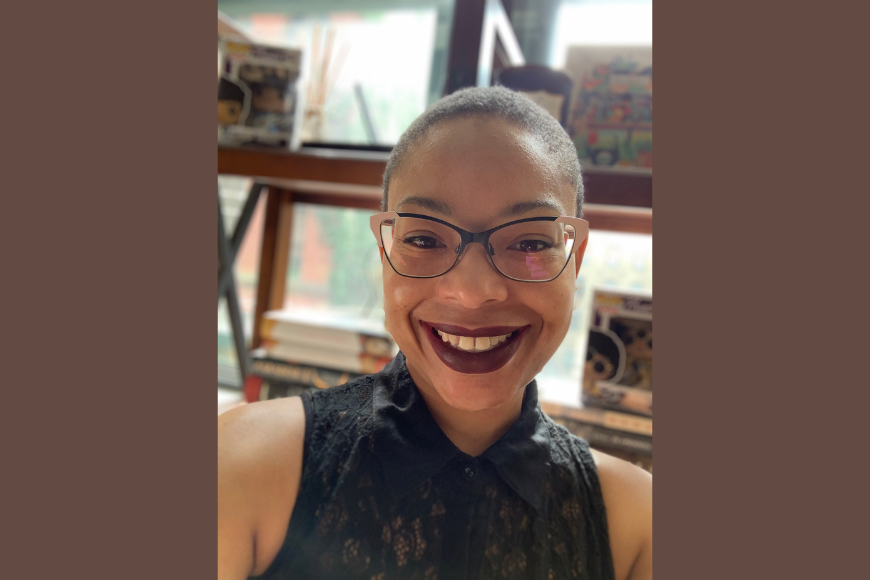Rethinking the Human in a Changing World
Kristen Reynolds began studying biology after high school and completed her undergraduate degree at Johnson C. Smith University, an HBCU in North Carolina. Feeling unsatisfied with the biology PhD program in which she found herself afterwards, Kristen decided to pivot towards her original passion and received a bachelor’s and master’s degree in English from University of North Carolina Charlotte. After working in programming for student affairs for a few years, she applied to the University of Minnesota’s American studies PhD program. She joined the program in 2020 with the ambition of melding her love of humanities-based methodologies for addressing societal issues with her continued fascination with science and technology and what is perceived as the natural world.
Illustrating and Decentering the Human
Kristen’s dissertation project proceeds along two pathways of inquiry. This structure is inspired by Dr. Zakiyyah Iman Jackson’s Becoming Human, a book that Kristen credits as introducing her to Black feminist posthumanism. Becoming Human’s chapters each builds up a different approach to conceiving of the human as a philosophical and antiblack figure and then use specific pieces of writing and art to illustrate or intervene in those examples.
Kristen describes her project as “thinking about how technology coheres around a particular idea of the human. When technologists set out to say, ‘I’m going to make this technology [or] do this certain thing that’s going to have a social impact that’s for the good of humanity,’ they have a certain idea of what counts as humanity.” Her analysis goes back to the writings of the Enlightenment period since so much of the way we currently understand the category of “human,” as well as the philosophy of technology, is shaped by Enlightenment thinkers in the realm of philosophy and the natural sciences.
If tracing present-day ideas of humanity and technology (with a special emphasis on race) was not already an ambitious task, Kristen is also coupling that literary and scientific analysis with an intensive study of Afrofuturism and Black speculative literary and visual arts to identify new philosophies which decenter the human. Each chapter of Kristen’s dissertation targets a different discipline or realm of society and aims to accomplish the alchemical feat of combining past and future and technology and race, to distill a fresh and original theory in the vein of Afrofuturism. To do this, Kristen reads texts from an almost unfathomable breadth of disciplines and methods, from books on surveillance to wealth and finance to artificial intelligence and machine learning. (Kristen will gain hands-on experience in the latter field this year, thanks to an ACLS/Mellon Dissertation Innovation Fellowship.)
Kristen has long been fascinated by speculative art’s ability to describe radically different futures whose structures, philosophies, and priorities depart from those upon which our world today is built. However, she has found that many treat the speculative as nothing more than fantasy, not something to draw from as we build a new tomorrow. Since the pandemic and the upheaval caused by the killings of George Floyd, Breonna Taylor, and so many others, powerful visions of radically different futures have emerged and reemerged, such as those in the writings of adrienne maree brown, Octavia Butler, and N.K. Jemisin, among so many others. Because of this, Kristen has noticed a new, mainstream openness to envisioning change built outside of current dominant structures. Kristen is quick to note that while Black and indigenous speculative art is having a moment of recognition in many academic circles, the artists and writers have been around for a long time.
Absorbing and Disseminating the Interdisciplinary
While the topic of Kristen’s work is conceptually complex, her findings have important implications for a vast range of disciplines as well as for individual people, so she does consider and appeal to her large potential audience. While pulling together scholarship from so many fields into a single piece of coherent scholarship is already a difficult endeavor, Kristen is willing to do the difficult next step of making her work legible and enticing to practitioners of each of the disciplines from which she borrows. In many ways, Kristen turns to her training in English and love of reading and writing speculative fiction to accomplish this task. “One of the things I think I do well as a creative writer is worldbuilding,” she says, continuing:
It’s one of my favorite things to do and I think that that capacity for world building is translating to my academic work in trying to think through how these seemingly disparate pieces connect to each other. How do I use them to tell the story that I’m trying to tell? That’s how I approach my academic work. There’s a particular story here and I’m trying to find it and I’m putting together the people who will help me tell that story in the best way.
Kristen’s skill at writing as well as her having read so many books and attended so many presentations on topics with which she was not familiar has given her a keen sense of how to communicate the core of a story to both specialists and general readers without oversimplifying or overcomplicating for anyone - a true tightrope act.
Kristen has also been active on a number of initiatives outside her formal program of study. For the last two years, she has been a researcher with Project GRUDGE (Groundwork Research on Under-resourced, Disabled, Grad Experiences), which aims to uplift and nuance the experiences of under-resourced, multiply-marginalized disabled graduate students at the University of Minnesota. GRUDGE is an initiative of the Mellon-funded organization Minnesota Transform.
Also, Kristen and her colleague in American Studies, DeWitt King, applied for and received funding and support to create a critical reading group entitled Black Studies, Then and Now. The purpose of this group, as Kristen says, was to “spend time rooting ourselves in the origins of Black studies.” The creation of the group was spurred by Kristen and DeWitt taking a course with Associate Professor Elliott Powell, in which they discussed contemporary conversations within Black thought. They realized that those conversations are based on ideas and debates in Black Studies dating back to the 1960s, and that in order to more fully understand Black studies today, they needed to ground themselves in the visions and pathways imagined by Black thinkers decades ago. Other students felt this need as well and joined them in reading passages from The African American Studies Reader and related texts.
The group also met with Macalester College Professor Duchess Harris in order to get her own historical perspective on shifts within the field of Black studies since she herself became one of the first Black people to graduate from the University of Minnesota’s American studies PhD program. Experiences like working with GRUDGE and the reading group allowed Kristen to fully immerse herself in conversations related to her area of study. Kristen emphasizes that she is not the sole originator of the dozens of ideas that go into her dissertation, but rather that she develops them through constant conversations with friends, family, and advisors, saying, “These ideas are community ideas. I’m just writing the thing.”
Sylvia Wynter’s “A Science of the Word”
This summer, Kristen was able to embed herself within another scholarly community more closely related to her own work. Partially supported by a RIDGS Travel Award, Kristen attended the “Black Studies/Science Studies: A Science of the Word Conference” at UC Irvine. The conference was dedicated to unpacking the writer Sylvia Wynter’s idea of “a new science, beyond the limits of natural science: a Science of the Word.” Kristen herself engages heavily with Wynter’s work, especially her dense article, “Unsettling the Coloniality of Being/Power/Truth/Freedom: Towards the Human, After Man, Its Overrepresentation—An Argument.” Here, Wynter propounds the idea that what we consider to be “the human” is simply one of several iterations or genres of human and that a reckoning with this idea could spur a revolution within scientific fields. According to Wynter (in conversation with philosophers such as Franz Fanon and Aimé Césaire), our current conception of the human stems from Enlightenment philosophy and has been deployed as a way to legitimize the dehumanizing treatment of Black, indigenous, Jewish and other peoples throughout that period and beyond. During the Enlightenment, philosophers like Immanuel Kant theorized about what set humans apart from animals and devised sets of characteristics of “humans,” characteristics which coincided most strongly with their own Western European cultures and as such, were negatively applied to non-Europeans in order to conceive of them as less-than-human. These hierarchies were not merely philosophical or sociological theories, but, during that time, became part of the bedrock of the burgeoning field of the natural sciences, or biology. For the sake of brevity, this article will not delve much deeper into this profound wellspring of theory, except to note that Wynter reaches the vital conclusion that what it means to be human is not a stable biological status, but rather an ever-changing narrative created by humans to understand their positions in the world to suit different situational contexts.
Kristen sees herself in dialogue with Wynter, especially with this argument for a “new science that we create that understands that we are both natural, biological beings, but we’re natural biological beings that tell stories about ourselves and our place in the world.” She expands on that by asking and addressing additional questions: “What would that then do for science? All of the things that we understand to be natural, are they still natural? Does “natural” even exist?” The Black Studies/Science Studies Conference provided Kristen with even more ideas to grapple with regarding the potential connections between Black thought and Science as well as how, in some cases, “we can use scientific ideas to break open questions about Blackness and Black ontology.” See, for example, Michelle M. Wright’s Physics of Blackness.
Wide-Ranging Implications
Because Kristen’s work has the potential to not only impact academic work but also cause individuals to fundamentally rethink their own daily lives and place in the world, reactions to it have ranged from complete fascination to willful refusal to understand or engage. Persuading others to rethink the commonly-perceived immutability of “human” and “nature” is a difficult task, although Kristen points out that there are many easily visible examples. For example, many medical practitioners in the very recent past and still today treat Black pain as biologically different from that experienced by other racial groups. And of course, scientists and laypeople alike today are rethinking the question of what it means to be human after being confronted with artificial intelligence programs which can perform so many tasks only recently thought of as being exclusive to human intelligence.
In pursuing so many lines of inquiry, Kristen continuously encounters fascinating stories and examples which contribute to the building of her central thesis. As an example, she shared that she had recently read NYU Professor Nicole Starosielski’s work about the network of undersea fiber optic cables which provide internet across the world. Starosielski discusses the importance of Pacific islands to the construction and maintenance of this network, and notes that while countries such as the United States have so many access points for internet, ensuring that it can never be lost, the island nations each only have one access point, making them vulnerable to being cut off from the rest of the planet. In addition to the imperialistic nature of this relationship, Kristen also sees this as “telling a narrative about who is understood to be human at a material technological level. Certain people need this access to the internet to participate in the trappings of humanity, to participate economically.”
Amidst all of her work dealing with existential questions about what it means to be Black and human in a rapidly changing technological world, we asked Kristen how she herself feels about the future. She has a lot of hope, not necessarily that improvements will come through traditional political channels addressing social and technological issues, but rather through a spreading awareness within smaller communities that kindness, safety, and fulfillment can come from unexpected and non-traditional sources, saying:
The way that I enter into the world is to be like, ‘this is the nature of our circumstances, and we can either accept that and work with it, or we can pretend like that’s not what’s in front of us.’ And I think, in the wake of Covid, in the wake of George Floyd, in the wake of all the other George Floyds, that continues to be a really painful thing to have to think about and to sit in and to live with. And I think part of that is informed by a desire to maintain what currently exists…What I’m really interested in is not just a few people making it out; I want us all to win. When I think about my work and what it means to rethink our nature of being, it also means to rethink my relationship with people and to resist how we’re brought up in the world in the United States, the intensive individualism, the ‘let me get wealthy, let me get this, let me get that;’ it’s to really resist those kinds of urges and to think more about, ‘is what I’m doing benefitting my community?’ I give to people what I need from them. And what I need is care, and what I need is love, and sometimes what I need is money. So I give people what I need and if I have abundance, then we all have abundance…I try to find a Black feminist path through all of this mess to the community of care and love that we’re all hungry for.
This need for care and abundance is a priority which Kristen hopes will inform the creation of new technologies.


